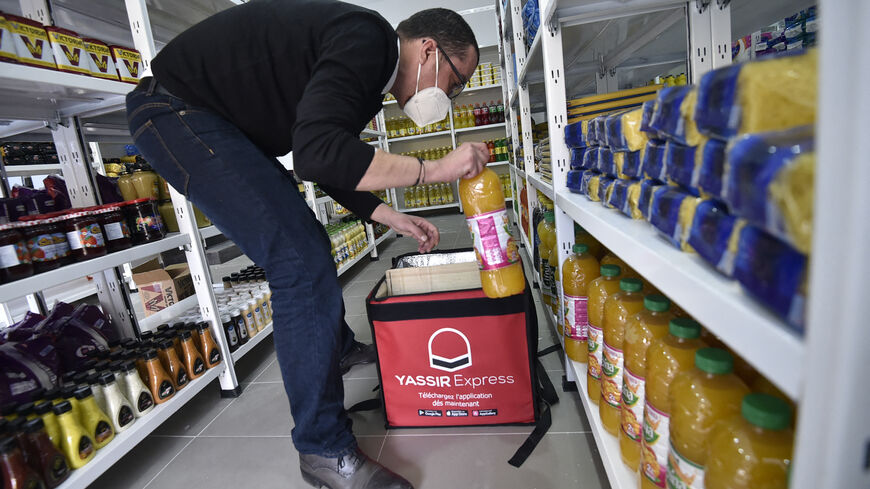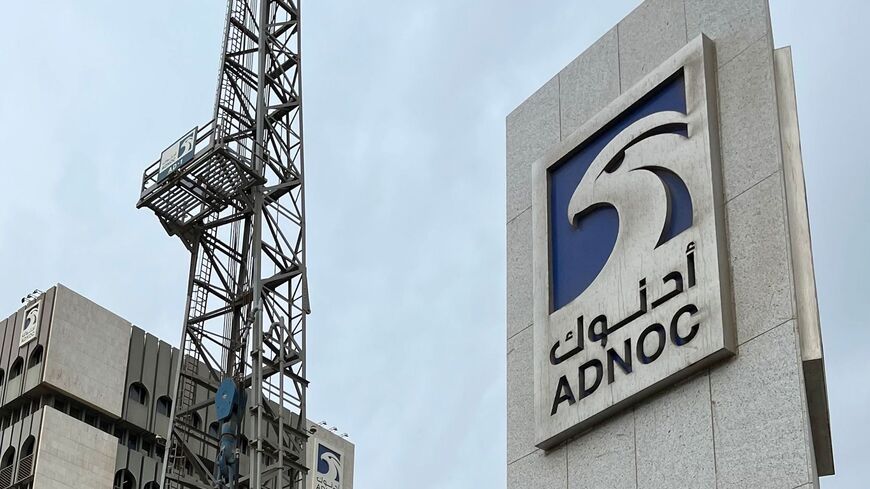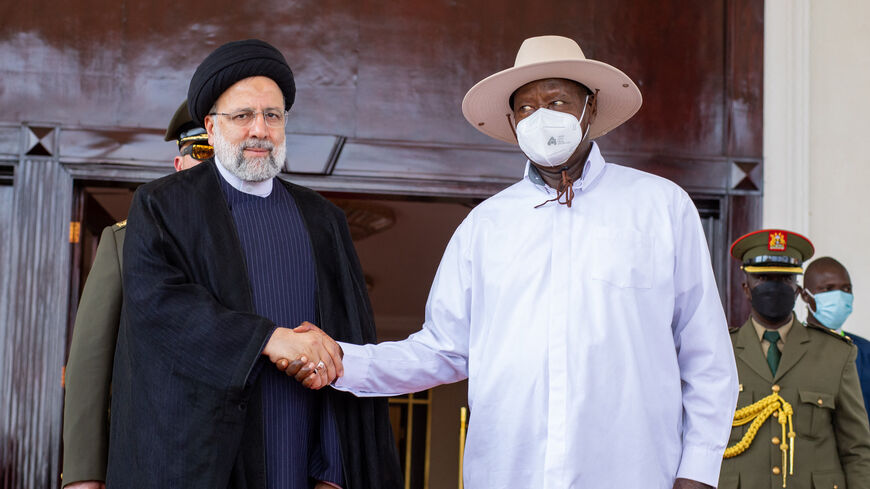Mega funding rounds fuel Middle East's rising fintech giants
Al-Monitor Pro Members
Samuel Wendel
Senior Market Research Analyst, Al-Monitor
Feb. 21, 2023
Mega funding rounds — those over $100 million — were once rare for startups globally and almost non-existent in MENA. But that’s changing and the main reason is financial technology, or fintech, which boomed when the pandemic helped drive regional adoption of online services. In 2022, fintech companies (or those with fintech solutions core to their offerings) delivered five of MENA’s 10 largest mega rounds. Those five deals, a mixture of equity and debt financings, were alone worth $680 million combined and accounted for nearly 20% of all regional startup funding in 2022. Already, that trend is continuing into 2023: Egypt’s MNT-Halan, a super app offering numerous financial products, announced $400 million in new funding in February at a $1 billion valuation. Despite a global tech industry downturn amid broader economic uncertainty, MENA’s fintech companies are raising more capital than ever, a development that could reshape the region’s tech sector.
- MENA was home to 955 fintech industry startups or scale-ups either founded or headquartered in the region as of early 2023, with a combined enterprise value of $17.8 billion, according to startup data provider Dealroom.
- Fintech was the region’s top funded startup sector in 2022, accounting for nearly a third of the $3.94 billion raised by all local startups, according to Wamda (these numbers exclude Israel). More broadly, fintech funding in MENA grew the fastest in the world in H1 of 2022, according to Dealroom.
- Exact figures vary on how much regional fintech startups raised, with Wamda reporting the sector attracted $1.1 billion in 2022, while Dubai-based startup data firm Magnitt recorded $925 million in funding across 131 deals.
- Either way, it was a record year for fintech in MENA, with investment totals roughly doubling compared to 2021 — powered by five mega rounds. This comes after MENA produced three fintech mega rounds in 2021 worth a combined $330 million.
- Bahrain-based crypto exchange Rain recorded the first fintech mega round of 2022, raising a $110 million series B round from investors including Silicon Valley VC Kleiner Perkins and Coinbase Ventures, among others.
- In April, Saudi Arabia’s Foodics — a cloud-based technology and payments platform for restaurants — raised a $170 million series C round led by global tech investor Prosus and Sanabil, an investment company owned by Saudi Arabia’s wealth fund. In June, Egypt’s MNT-Halan closed a $150 million securitized bond issuance.
- Investors targeted buy now, pay later (BNPL) opportunities in particular: in August, Saudi BNPL startup Tamara raised $100 million, while UAE-based competitor Tabby secured debt financing worth $150 million from two US investors, Atalaya Capital Management and Partners for Growth.
- Although MENA’s fintech startups have largely bucked the global tech investment downturn, data indicated that regional startup investment activity was erratic quarter-on-quarter in 2022. That came with downward pressure on valuations, including around fintech, alongside reports of layoffs and cost cutting among regional startups.
- Still, fintech started hot in 2023 thanks to MNT-Halan’s historic round in February. However, BNPL player Tabby also raised $58 million in January at a $660 million valuation from investors including Sequoia Capital India, PayPal Ventures and Mubadala Investment Capital, among others. Tabby’s round represented over half of all funding raised by MENA startups in January, according to Wamda. However, the month saw a 66% decline in funding value year-on-year.
- Broader trends point to continued fintech promise: 70% of MENA consumers preferred digital payment methods in 2022, up from 40% in 2020, according to a regional survey by Checkout.com. 82% reported using a fintech app in 2022, while cash-on-delivery usage declined nearly 40% in the past 24 months.
- Checkout.com also found that half of consumers in the UAE and Saudi Arabia used BNPL in 2022 and 67% across MENA indicated they may use it in 2023. The Middle East’s crypto market — although small — also grew faster than any other region in 2022, according to blockchain data platform Chainalysis.
- This comes as Gulf countries have more aggressively courted the fintech industry in recent years. Notably, Bahrain and the UAE have rolled out the welcome mat for crypto. That saw key industry players win local licenses in 2022, including Binance and the now disgraced FTX.
- There’s also rising momentum around open banking — a practice whereby a third party gains access to a customer’s financial data to offer more advanced and innovative banking services. For instance, the Dubai Financial Services Authority granted its first license to an open banking platform in 2022.
- Key banks are eying fintech too. First Abu Dhabi Bank has spun out a payments business called Magnati and agreed to sell a 60% stake in it to Brookfield Business Partners in 2022 at an implied valuation of up to $1.15 billion.
- Among global fintech players active in the region, US payments giant Stripe expanded into the Middle East in 2021 with a UAE office, while that same year saw Australian BNPL company Zip fully acquire Dubai-based BNPL provider Spotii. Global investors are also increasingly targeting regional fintech, like the storied Silicon Valley VC brand Sequoia, which made its first fintech investment in the Gulf in 2022.
Scenario 1: MENA’s leading fintech companies rush for the exit
This wave of mega rounds further accelerates fintech growth, separating the winners from the pack, and comes as regional IPO activity remains elevated and interest in local technology listings rises. That positions MENA’s best of breed fintech companies to explore offerings on regional or international exchanges instead of seeking additional late stage funding rounds.
That said, few local tech startups have successfully gone public to date and the industry didn’t feature prominently during the 2022 IPO boom in the Gulf. In 2019, Dubai-based payments processor Network International listed in London and e-payments giant Fawry went public in Egypt, but more recently several regional tech players — including mobility company Swvl and streaming platform Anghami — opted to go public in the US by merging with a publicly traded special purpose acquisition company (SPAC). However, this alternative to traditional IPOs looks less attractive after SPAC activity cratered in 2022.
Scenario 2: Fintech funding cools off in MENA
As global economic uncertainty deepens in 2023, both local and key international investors tap the breaks on regional startup investments. That sees fewer (and smaller) fintech mega rounds in 2023, which results in overall sector funding totals plummeting.
Although some industry verticals — notably crypto — may face headwinds in 2023, fintech’s full potential is now clearer than ever in a region featuring a population that is large, youthful and tech savvy. Sophisticated investors with long-term outlooks won’t want to miss these regional opportunities and they now have more leverage thanks to falling valuations. That should keep fintech funding activity elevated.
Local fintech companies have already announced roughly $460 million in new funding in early 2023, positioning the sector for another record-breaking year. Open banking and BNPL competition will likely fuel further evolution and help drive new investments too. Overall fintech progress is still likely to be fragmented — especially with crypto now in a precarious state — but recent mega rounds are already paving way for several leading fintech companies to entrench competitive advantages. That could accelerate M&A in 2023, with key fintechs positioned to snap up smaller startups, while incumbent financial players should be eyeing sector opportunities too. A fintech IPO wave is unlikely, but there is potential for sector activity on Saudi Arabia’s parallel equity market Nomu, which has lighter listing requirements than its main Tadawul exchange. The wild card is global competition. International investors now feature prominently in regional fintech deals, but MENA’s actual fintech market itself remains largely localized. Rather than compete directly with local fintechs, global industry players may emulate Amazon or Uber by exploring a regional acquisition.
Samuel Wendel is a senior market research analyst with Al-Monitor covering economic, tech and business trends across the Middle East. He has previously served as a journalist with Forbes Middle East and Wamda, where he reported on key industry developments spanning a range of sectors in the region.
We're glad you're interested in this memo.
Memos are one of several features available only to PRO Expert members. Become a member to read the full memos and get access to all exclusive PRO content.

Already a Member? Sign in
The Middle East's Best Newsletters
Join over 50,000 readers who access our journalists dedicated newsletters, covering the top political, security, business and tech issues across the region each week.
Delivered straight to your inbox.
Free
What's included:
Free newsletters available:
- The Takeaway & Week in Review
- Middle East Minute (AM)
- Daily Briefing (PM)
- Business & Tech Briefing
- Security Briefing
- Gulf Briefing
- Israel Briefing
- Palestine Briefing
- Turkey Briefing
- Iraq Briefing
Premium Membership
Join the Middle East's most notable experts for premium memos, trend reports, live video Q&A, and intimate in-person events, each detailing exclusive insights on business and geopolitical trends shaping the region.
$25.00 / month
billed annually
$31.00 / month
billed monthly
What's included:
Memos - premium analytical writing: actionable insights on markets and geopolitics.
Live Video Q&A - Hear from our top journalists and regional experts.
Special Events - Intimate in-person events with business & political VIPs.
Trend Reports - Deep dive analysis on market updates.
We also offer team plans. Please send an email to pro.support@al-monitor.com and we'll onboard your team.
Already a Member? Sign in






